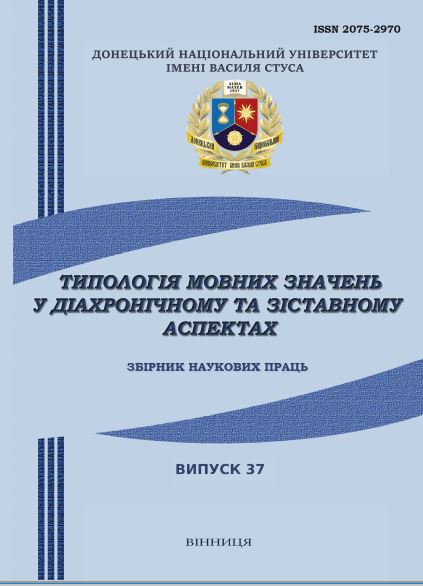Development of Meanings in Verbs Belonging the Lexical-Semantic Group of Overland Movement in English.
DOI:
https://doi.org/10.31558/2075-2970.2019.37.1Keywords:
verb, ‘overland movement’, lexical-semantic group, lexical meaning, semantic structure, semantic shiftsAbstract
The article dwells upon the peculiarities of the semantic development within the lexical-semantic group of overland movement verbs in English. The fundamental category of human existence is space. The leading role in the expression of static or dynamic localisation of spatial relations belongs to the verbal vocabulary. Most of the researches devoted to this issue concentrate on the lexical-semantic aspect and are carried out on the material of one language only. The relevance of the article is stipulated by the increased interest in the verbal lexical meanings development within the ‘overland movement’ group as components of the thematic group since these verbs are important for understanding fundamental aspects of the human life. They are marked by specific features within every linguaculture under consideration.
Verbs with the meaning ‘overland movement’ as a microsystem in English are selected as the object of the current study. The subject of the research involves the structure of lexical meanings of the verbs which belong to the group of ‘overland movement’ as a set of components within the corresponding lexical-semantic group including changes in their semantic structures. The aim of the research is to identify peculiarities of development in the lexical meaning of these verbs. The methodology of the research embraces the componential, structural-semantic analysis as well as the descriptive method. The study is based on the empiric corpus (107 verbs with the meaning ‘overland movement’) obtained by the continuous sampling from the dictionary «Macmillan English Dictionary for Advanced Learners» (2006). The analysis will be further continued and the conclusions of the present research have preliminary character.
References
Ahmanova, O. S. (1957). Ocherki po obshhej i russkoj leksikologii. M. : Uchpedgiz.
Apresjan, Ju. D. (1995). Leksicheskaja semantika: Izbrannye trudy. T. I. 2-e izd., ispr. i dop. M. : Shkola «Jazyki russkoj kul'tury», Izdatel'skaja firma «Vostochnaja literatura» RAN.
Arutjunova, N. D. (1999). Put' po doroge k bezdorozh'ju. Logicheskij analiz jazyka. Jazyki dinamicheskogo mira. Dubna : RAN IJa. 3–18.
Chokubaeva, A. K. (2007). Leksiko-semanticheskij analiz glagolov v anglijskom jazyke i ih sopostavlenie s russkim i kyrgyzskim jazykami: avtoref. dis. … kand. filol. nauk: 10.02.20. Bishkek.
Filin, F. P. (1982). Ocherki po teorii jazykoznanija. M. : Nauka.
Fillmor, Ch. (1988). Frejmy i semantika ponimanija. Novoe v zarubezhnoj lingvistike. Vyp. 23. Kognitivnye aspekty jazyka / Sost. Petrova V. V. i Gerasimova V. I. M. : Progress. 52–92.
Fillmore, Ch. J. (1982). Towards a descriptive Framework for Spartial Deixis // Speech, Place and Action: Studies in Deixis and Related Topics / Ed. by RJ. Jarvella and W. Klein. Chichester: John Wiley. 31–59.
Gak, V. G. (1977). Sopostavitel'naja leksikologija: (Na materiale francuzskogo i russkogo jazykov). M. : Mezhdunarodnye otnoshenija.
Grejmas, A. Zh. (2004). Strukturnaja semantika. Poisk metoda. M. : Akademicheskij proekt.
Ivanytska, N. B. (2010). Dіjeslіvne virazhennja mіkrokategorji «ruh» v ukrajins'kіj ta anglіjs'kіj movah. Nauk. vіsnik Chernіvec'kogo universytetu. Serіja «Fіlologіchnі nauky». Vip. 86. Chernіvcі : ChNU. 97–105.
Kacnel'son, S. D. (2001). Kategorii jazyka i myshlenija: Iz nauchnogo nasledija. M. : Jazyki slavjanskoj kul'tury.
Kubrjakova, E. S. (1978). Chasti rechi v onomasiologicheskom osveshhenii. M. : Nauka.
Majsak, T. A., Rahilina E. V. (2007). Glagoly dvizhenija v vode: leksicheskaja tipologija. M. : Indrik.
Poddubnyj, A. P. (2005). Kognitivnye modeli situacij peshego peremeshhenija i sposoby ih leksikalizacii: dis. ... kand. fil. nauk. SPb.
Rozina, R. I. (2005). Semanticheskoe razvitie slova v russkom literaturnom jazyke i sovremennom slenge: glagol. M. : Azbukovnik.
Soboleva, P. A. (1980). Slovoobrazovatel'naja polisemija i omonimija. M. : Nauka.
Sokolova, N. M. (1967). Glagoly dvizhenija v sovremennom anglijskom jazyke: avtoref. dis. ... kand, filol. nauk. Leningrad.
Sternin, I. A. (1979). Problemy analiza struktury znachenija slova. Voronezh : Izd-vo Voronezhskogo un-ta.
Talmy, L. (1985). Lexicalization Patterns: Semantic Structure in Lexical Forms // Language Typology and Syntactic Description. Vol. III. Cambridge: University Press. 55–150.
Vinogradov, V. V. (1972). Russkij jazyk. Grammaticheskoe uchenie o slove. 2-e izd. M. : Vysshaja shkola.
Yarema, E. F. (2008). Funkcional'no-semanticheskie osobennosti glagolov dvizhenija (na materiale raznosistemnyh jazykov): avtoref. dis. … kand. filol. nauk: 10.02.19. Majkop.

